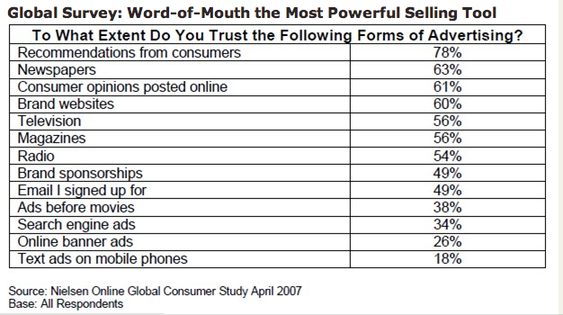October 3, 2007
This just in from the folks at Nielsen. No great shock (I don’t think) to see word of mouth topping the chart, in terms of effective selling tools. The power of a recommendation from a known/trusted source has long been the gold standard.
But what’s pretty interesting, and a big change from a few years ago, is the third highest item on the list. Opinions posted online.

So, what do you think? What does this say about blogging? Sites like epinion.com?
If you’re on the company side — what do you think it means for you and where you spend your resources? If you’re a consultant or agency-side pro — what do you think it means for you and for your clients?
By the way…this was an international survey. It covers 47 Markets: Argentina, Australia, Austria, Belgium, Brazil, Canada, Chile, China, Czech Republic, Denmark, Egypt, Estonia, Finland, France, Germany, Greece, Hong Kong, Hungary, India, Indonesia, Ireland, Italy, Japan, Latvia, Lithuania, Malaysia, Mexico, Netherlands, New Zealand, Norway, Philippines, Poland, Portugal, Russia, Thailand, Singapore, South Africa, South Korea, Spain, Sweden, Switzerland, Taiwan, Turkey, UAE, United Kingdom, US and Vietnam.
Related posts:
~ How to get customers to talk about you
~ Is that your hand in my pocket?
~ Your future customer is behaving very oddly
More
 RainToday.com (one of my favorite resources) has an eye-opening collection of articles that reveals the 10 major problems encountered by decision makers during the process of hiring consulting and professional services providers.
RainToday.com (one of my favorite resources) has an eye-opening collection of articles that reveals the 10 major problems encountered by decision makers during the process of hiring consulting and professional services providers. 






![Reblog this post [with Zemanta]](http://img.zemanta.com/reblog_e.png?x-id=d93e3fb8-f707-4698-a9a7-da711dfeadf3)

![Reblog this post [with Zemanta]](http://img.zemanta.com/reblog_e.png?x-id=1108740f-5546-49cf-83bf-3f493fd82ab8)

![Reblog this post [with Zemanta]](http://img.zemanta.com/reblog_e.png?x-id=521b6369-3ed1-4580-ab53-41747316a144)

![Reblog this post [with Zemanta]](http://img.zemanta.com/reblog_e.png?x-id=11ea4d60-fb70-4cd1-a191-fd6b07bfb673)